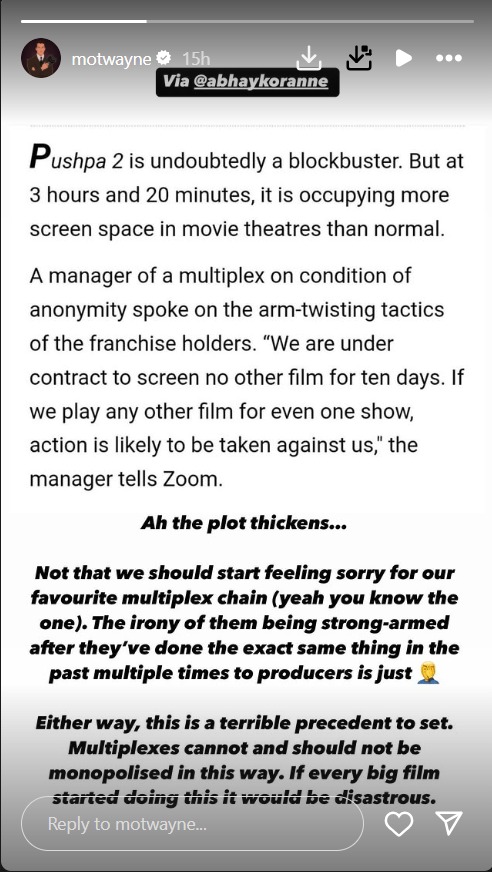Filmmaker Vikramaditya Motwane has raised concerns over the growing influence of big-budget films, specifically the recent blockbuster Pushpa 2, on theatre screen schedules. In a lengthy post on social media, Motwane shared his dissatisfaction with the film’s prolonged screening duration, which has been causing disruptions for other films vying for screen time.
At 3 hours and 20 minutes, Pushpa 2 occupies significantly more time on multiplex screens compared to typical films, leading to scheduling conflicts for other movies. According to a source within the industry, who spoke on the condition of anonymity, multiplexes are under pressure to exclusively screen Pushpa 2 for a minimum of ten days. Any attempt to show another film, even for a single show, reportedly risks severe repercussions, including potential action from the film’s distributors.
Motwane’s post criticizes this practice, suggesting that it sets a dangerous precedent for the film industry. He argues that if other major films start imposing similar demands, it could severely disrupt the ecosystem for smaller films, limiting their visibility and reach in theatres. “Multiplexes cannot and should not be monopolized in this way,” Motwane wrote, highlighting the potential negative impact on both filmmakers and moviegoers.

Interestingly, Motwane’s comments also point to a certain irony, as multiplex chains have themselves been accused of engaging in similar tactics in the past, where they prioritize certain films at the expense of others.
Despite this, the filmmaker emphasizes that such practices, when reciprocated by major film franchises, create an unsustainable environment for the industry as a whole.
The issue touches on a broader conversation about the balance of power in cinema distribution, where large films with massive commercial backing often overshadow smaller productions.
As the situation continues to evolve, industry stakeholders, including producers, exhibitors, and audiences, will need to navigate the complexities of screen sharing to ensure a fair and diverse moviegoing experience.
As of now, it remains to be seen whether the dominance of Pushpa 2 will spark any significant changes in how film distribution agreements are structured moving forward.


